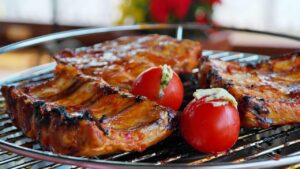Welcome to the world of outdoor cooking aficionados! If you’re passionate about grilling and want to take your culinary skills to the next level, then the Blackstone Griddle is your ultimate cooking companion.
In this article, we’ll explore the common issues of flaking and peeling on your Blackstone Griddle and share some effective tips to overcome these hurdles. So, grab your chef’s hat and let’s dive in!
Understanding Flaking and Peeling:
Flaking and peeling on a Blackstone Griddle can be frustrating, but don’t be disheartened! It’s a common problem faced by many grilling enthusiasts.
Flaking refers to the appearance of rough spots or patches on the griddle surface, while peeling occurs when the seasoning begins to come off, exposing the bare metal beneath.
These issues can be caused by incorrect seasoning techniques or inadequate maintenance.
Tips to Preserve Your Blackstone Griddle:
- Proper Seasoning Technique: Start by cleaning your griddle thoroughly using a mild dish soap. Rinse it well and heat it until all moisture evaporates. Apply a thin layer of vegetable oil or any high-smoke point oil evenly across the griddle surface using a cloth or paper towel. Repeat this process multiple times, allowing each layer to cure before applying the next. This will build a protective layer of seasoning, preventing flaking and peeling.
- Regular Maintenance Routine: After each use, it’s crucial to clean your griddle properly. While it’s still warm, scrape off any food residues using a grill scraper or spatula. Pour some hot water onto the surface and scrub it gently with a griddle brush. Dry thoroughly to prevent rust formation. Applying a light coat of oil after cleaning will help maintain the seasoning.
- Avoid Harsh Cleaning Agents: Harsh cleaning agents, such as metal brushes or abrasive cleaners, can damage the seasoning and lead to flaking. Opt for gentle cleaning methods and tools to prolong the life of your griddle.
Real-life Example:
Meet John, an enthusiastic Blackstone Griddle user. John loves hosting weekend backyard cookouts for his friends and family. Recently, he noticed some flaking on his griddle surface and was concerned about its impact on his grilling experience.
Following our tips, John successfully resolved the issue and is regularly delighting his guests with delicious meals hot off his perfectly seasoned Blackstone Griddle!
Let’s take a pause and summarize the key tips:
| Tips to Preserve Your Blackstone Griddle |
|---|
| 1. Proper Seasoning Technique |
| 2. Regular Maintenance Routine |
| 3. Avoid Harsh Cleaning Agents |
Troubleshooting Flaking and Peeling:
In case flaking and peeling persist despite your efforts, there might be some underlying reasons requiring further attention. Here are a few additional troubleshooting tips:
- Temperature Control: Ensure you are preheating your griddle to the correct temperature. Uneven heating can lead to flaking, so make sure the entire surface is heated evenly.
- Storage Conditions: Improper storage can also contribute to flaking and peeling. Protect your griddle from moisture, extreme temperatures, and excessive humidity. Consider investing in a griddle cover or keeping it in a dry area.
- Quality Seasoning Oils: Experiment with different types of high-quality oils for seasoning. Some cooking oils work better than others based on their smoke point and ability to create a durable seasoning layer.
Conclusion:
The Blackstone Griddle opens up a world of culinary possibilities, and with the right maintenance and seasoning techniques, flaking and peeling can be easily conquered.
Implement the tips mentioned here, and you’ll be well on your way to mastering the art of outdoor grilling. So, gather your favorite ingredients, fire up the griddle, and let your gastronomic creativity run wild!
Remember, a well-maintained Blackstone Griddle will not only enhance your cooking experience but also impress your family and friends with mouth-watering meals that will keep them coming back for more!
Happy Grilling!
Table Summary:
| Troubleshooting Flaking and Peeling |
|---|
| 1. Temperature Control |
| 2. Storage Conditions |
| 3. Quality Seasoning Oils |
